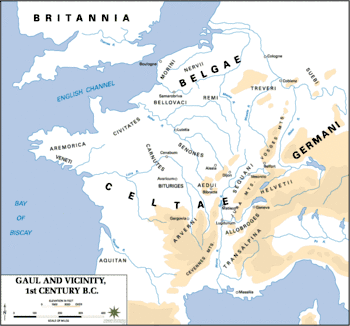Allobroges
The Allobroges (Gaulish: "foreigner, exiled";[1] Ancient Greek: Άλλόβριγες, Άλλόβρυγες, Άλλόβρoγες) were an Iron Age Gallic tribe, dwelling between the Rhône river and the Alps mountains during the Roman period.[2]

Name
They are mentioned as Allobroges by Livy (late 1st c. BC),[3] as A̓llóbriges (Ἀλλόβριγες:; var. Ἀλλόβρυγες, Ἀλλόβρογες) by Ptolemy (2nd c. AD),[4] and as Allobrogas by Orosius (early 5th c. AD).[5][6]
The name Allobroges means in Gaulish 'foreigner, exiled, those from another country', stemming from the root allo-, 'other', attached to the word brogi, 'country'.[7][1]
Geography
The territory of the Allobroges stretched between the Isère and the Rhône rivers, lacus Lemannus and the Alps.[2]
Caesar says that the Segusiavi were the "first tribe outside the province" (Gallia Transalpina) on "the far side of the Rhône" and that he marched from the Allobroges to the Segusiavi; that is, the former occupied the east bank of the Rhône.[8] On the north, the Rhône divided the Helvetii from the Allobroges; i.e., the latter were on the south bank of the river and Lake Léman from which it flows. Geneva was Allobrogian. Caesar says the Allobroges were "recently subdued".[9]
Settlement
Their capital was today's Vienne.
History
The Allobroges probably settled relatively late in Gaul, since they are not attested before the late second century BCE, in connection with Hannibal's crossing of the Alps.[2]
In 123 BC, they gave shelter to King Tutomotulus (or Teutomalius), of the tribe of the Salluvii which Rome had conquered, and refused to hand Tutomotulus over. Rome declared war and moved against the Allobroges. On August 8, 121 BC the legions of Quintus Fabius Maximus defeated them and forced them to submit; Maximus earned the cognomen Allobrogicus for this feat.
The Allobroges additionally played a rather important part in deciding to foil the second Catilinarian Conspiracy of 63 BC, an attempt to foment civil war throughout Italy and simultaneously burn down Rome. It was a plot by ostracized high political Roman elites and allied plebeian military connected to their cause. The conspirators made the mistake of attempting to recruit the Allobroges via their ambassadors' delegation, who happened to be in Rome during the planning of the conspiracy. Since the Allobrogian delegation was in Rome seeking relief from the oppression of their Roman governor, one of the Catiline conspirators, Lentulus Sura instructed Publius Umbrenus, a businessman with dealings in Gaul, to offer to free them of their miseries to throw off the heavy yoke of their governor—if they would join the Catiline conspiracy against Rome.[10]
The conspiracy was revealed to the Allobroges, however their diplomatic envoys informed the current consul Cicero. Cicero instructed the Allobroges' envoys to get tangible proof of the conspiracy. Thinking they were gaining allies, five of the leading conspirators wrote letters to the Allobroges so that the envoys could show their people that there was hope in a real conspiracy. However, Cicero had the letters intercepted as the envoys left Rome [11] and read them before the Senate the following day, in the third of his Catiline Orations. With the plot exposed, the ringleaders were rounded up or sacrificed themselves, mostly in unprepared pitched battles around Rome.
However, they rebelled on their own shortly thereafter. In 61 BC chief Catugnatus revolted but Gaius Pomptinus defeated them at Solonium.
Next, loyal once more, Allobrogian warriors joined Julius Caesar during his conquest of Gaul.[12] These included two brothers, Roucillus and Egus, the sons of Adbucillus who had been chieftain of the Allobroges for many years. In 'The Civil War' Caesar explains that these were men of "outstanding courage" [13] and had been availed of their excellent and stalwart service in all his campaigns in Gaul. Consequently, they had been greatly honoured by Caesar who had assigned to them the highest magistracies among their own people. Regrettably Caesar records that these privileges allowed the Allobroges to become "carried away by stupid, barbarian vanity" and "to look down on their own people, to cheat the cavalry of their pay, and to appropriate all the plunder for themselves" [13]
A generation later, Emperor Augustus placed the Allobroges in the region of Gallia Narbonensis and later Gallia Viennensis. Under the Roman Empire, Vienne grew and in 100 AD Tacitus described it as "historic and imposing". Archaeological excavations have revealed extensive warehouses. They collected tolls from traffic passing up Via Agrippa and various other Roman roads.
Religion
From the "Palace of Mirrors" baths at Saint-Romain-en-Gal, across the river from modern Vienne, but part of ancient Vienne, comes a statue of the town's tutelary goddess. North-east of Vienne and north of Cularo (modern Grenoble), is a major healing sanctuary at the modern town of Aix-les-Bains. This was dedicated to a southern Gaulish healing god Borvo, and not to Apollo as might have been expected of such a Romanised people.
Legacy
Légion des Allobroges
The First French Republic, in line with its common practice of reviving names and concepts from Roman times, gave the name "Légion des Allobroges" to a unit of the French Revolutionary Army that consisted mainly of volunteers from Switzerland, Piedmont and Savoy - very roughly corresponding to what had been the lands of the Allobroges.
See also
Notes
- Delamarre 2003, p. 39.
- Lafond 2006.
- Livy. Ab Urbe Condita Libri, 21:31:5
- Ptolemy. Geōgraphikḕ Hyphḗgēsis, 2:10:7
- Orosius. Historiae Adversus Paganos, 5:13:2
- Falileyev 2010, p. entry 3804.
- Lambert 1994, p. 36.
- Caesar & BG, Book I, Section 10.
- Caesar & BG, Book I, Section 6.
- Cicero, In Catilinam III.4; Sallust, Bellum Catilinae XL
- Cicero, In Catilinam III.6; Sallust, Bellum Catilinae XLV
- "The Civil War" by Caesar, translated with an introduction by Jane F. Gardner; Penguin Classics, London; C.W III, Ch. 59
- "The Civil War" by Caesar, translated with an introduction by Jane F. Gardner; Penguin Classics, London; pp. 135
Bibliography
- Delamarre, Xavier (2003). Dictionnaire de la langue gauloise: Une approche linguistique du vieux-celtique continental (in French). Errance. ISBN 9782877723695.CS1 maint: ref=harv (link)
- Falileyev, Alexander (2010). Dictionary of Continental Celtic Place-names: A Celtic Companion to the Barrington Atlas of the Greek and Roman World. CMCS. ISBN 978-0955718236.
- Lafond, Yves (2006). "Allobroges". Brill’s New Pauly.CS1 maint: ref=harv (link)
- Lambert, Pierre-Yves (1994). La langue gauloise: description linguistique, commentaire d'inscriptions choisies (in French). Errance. ISBN 978-2-87772-089-2.CS1 maint: ref=harv (link)
Initial material derived from the public domain Lemprière's Classical Dictionary of 1824.
Primary
- Caesar, Julius. De Bello Gallico.

